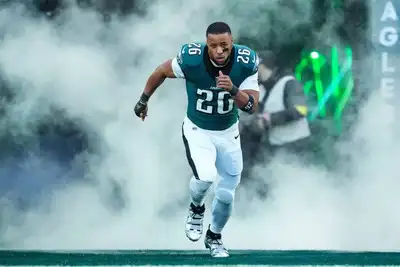Philadelphia Eagles running back Saquon Barkley didn’t mince words when it came time to defend one of the NFL’s most controversial and dominant plays—the “tush push.” Often maligned by opponents and traditionalists alike, the Eagles’ signature quarterback sneak variation has sparked ongoing debates about fairness, safety, and the evolution of football. But in a passionate defense of the strategy, Barkley made it crystal clear: critics are just being “soft and lame.”
Known for his explosive playstyle and powerful build, Barkley has long been one of the NFL’s most respected voices. Since joining the Eagles after a high-profile move from the New York Giants, he’s quickly become an integral part of the offense. And now, as part of a team that’s made the tush push nearly unstoppable with quarterback Jalen Hurts at the helm, Barkley is stepping into a new role—chief defender of the play that continues to irritate opposing fanbases and coaches alike.
Speaking to reporters after an OTA session, Barkley didn’t hold back. “All this whining about the tush push is soft and lame,” he said, eyebrows raised with conviction. “We’re playing football. If you don’t like it, stop it. Don’t cry about it.”
For the uninitiated, the tush push—also known as the “Brotherly Shove”—is a variation of the quarterback sneak that relies on raw power and precise execution. With Hurts under center, the Eagles line up in a short-yardage formation, and Barkley or another back gives a literal push from behind as Hurts drives forward behind the offensive line. It’s physical, it’s strategic, and so far, it’s been almost impossible to stop.
While the play has been a point of pride for Eagles fans, others around the league have called for it to be banned. Detractors argue that it gives an unfair advantage to teams with powerful offensive lines and running backs, and that it turns football into a “rugby scrum.” There have been murmurs from the NFL Competition Committee about evaluating the legality and impact of the play, but no rule change has been made—yet.
Barkley, however, sees the opposition for what it really is: fear and frustration. “Look, I understand it’s tough to defend. That’s kind of the point,” he said. “If we’re executing at a high level, if our O-line is moving bodies and Jalen is pushing forward, that’s called winning football. You want us to stop using it because you can’t figure out how to beat it? That sounds like a you problem.”
He continued: “Football is about toughness. It’s about leverage, strength, and who wants it more. You want to make it a finesse game, take all the physicality out of it? Then go watch flag football. But don’t try to handcuff us because we’ve figured out a way to dominate in short yardage. That’s just weak.”
The numbers back Barkley’s argument. Since the Eagles started leaning into the tush push with Hurts, their short-yardage conversion rate has skyrocketed. Whether it’s 3rd-and-1 or 4th-and-inches, the play has become nearly automatic. Opposing defenses have tried stacking the box, shifting the line, and even leaping over the pile—all to no avail. Hurts’ squat strength combined with a disciplined and physical offensive line has made the play a modern marvel of simplicity and efficiency.
And now, with Barkley added to the equation—a running back known for his leg strength and explosiveness—the play has only become more dangerous.
“If you don’t like getting pushed back a yard, then get stronger,” Barkley said with a shrug. “Hit the weight room. Study film. Come with a better plan. Don’t ask the league to bail you out because your team can’t stop a sneak.”
His comments were met with mixed reactions online. Eagles fans, unsurprisingly, rallied behind their new star. “Saquon gets it. Philly grit through and through,” one fan tweeted. Others across the NFL spectrum weren’t so enthusiastic. Some fans called Barkley’s remarks “arrogant” or “classless,” and a few even suggested his tone could further provoke league officials who are already under pressure to reevaluate the play’s legality.
But Barkley doesn’t seem worried. In fact, he relishes the idea of his words firing up the opposition. “I don’t play this game to make friends with the other team. I play to win,” he said. “If talking about it gets under their skin, good. Maybe they’ll come harder next time, and we’ll still push ‘em back anyway.”
The Eagles’ head coach Nick Sirianni also chimed in, subtly supporting Barkley’s position. “We’re not breaking any rules. We’re using what’s available in the rulebook to our advantage. And it’s working,” Sirianni said. “I love the passion Saquon brings. That edge—that toughness—it’s what we’re all about.”
As for Jalen Hurts, he kept things a bit more reserved. “We do what we need to do to win games,” he said when asked about the ongoing debate. “Whatever play gets the job done, that’s the one we’re running.”
Still, it’s Barkley’s voice that has emerged as the loudest and most defiant in the latest chapter of the tush push controversy. With his unapologetic tone and sharp rebuke of critics, he’s made it clear that this is more than just a play call—it’s a mindset. One that he believes defines the identity of a team unwilling to apologize for success.
“I’ve been on teams that struggled in short-yardage situations,” Barkley said. “You get stuffed on third down, you punt, and you lose. That’s not who we are in Philly. We’re built different. We’re built to move the chains, by any means necessary. And if that hurts your feelings? Sorry—not sorry.”
The NFL season hasn’t even started, but the temperature around the tush push is already boiling over. And with Barkley now in the mix, the Eagles aren’t just defending the play on the field—they’re defending it in the headlines, in the locker room, and in the identity of a franchise that thrives on pushing forward, no matter who tries to stand in the way.



